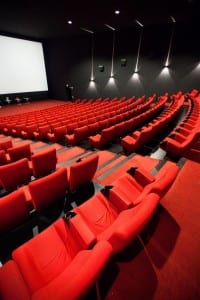Smoking at the Odeon: Memories of British Cinema-Going of the 1960s
By Clare S Ryan, on 14 May 2013
What are your most vivid memories of going to the cinema? Perhaps childhood visits to see cartoons, or seeing a film on a date? A new UCL project is asking people about their experiences of cinema-going in the 1960s, and, in doing so, raising interesting questions about what we remember about seeing films, and why.
As part of UCL’s Festival of the Arts, Matt Jones (UCL History) gave a talk about how he is researching people’s response to 1960s cinema.
The project is interested in how people remember films, what part cinema played in their lives and whether films have shaped their memory of the time.
Going to the cinema seems to evoke strong memories in all of us. Even though I wasn’t around in the 1960s, my own memories – like most people’s – of going to see films are mixed up with memories of who I went with, how old I was and where I saw the film.
Add to that the atmosphere of a dark auditorium, the overwhelming sights and sounds of the film, and details like the texture of the seats and the taste of sweet or salty popcorn and you have a rich mixture of sensory experiences.
And, indeed, although the project has only recently begun, people have already started coming forward with their tales of cinema in the 1960s. Many responses focus on how the experience differed from today. Details such as queuing for tickets, usherettes, priced seats, smoking in the cinema – even being unaccompanied with a date in the dark.
Why the 1960s?
Matt is particularly interested in 1960s cinema-going because it was famously a time of social change in Britain. He argues that, in cinema at least, two parallel Britains existed.
The first was the ‘swinging London’ of the 60s, where both abortion and homosexuality had been legalised and the introduction of the contraceptive pill had started a sexual revolution. Films such as Darling (complete with a mini-skirt clad Julie Christie), Blowup, Alfie, Bedazzled and the Beatles films reflected this aspirational mood.
On the other hand, you have the ‘kitchen sink dramas’ such as Saturday Night and Sunday Morning and A Kind of Loving. These were more in tune with the economic problems of the time, including a slump in trade with the Commonwealth and the beginnings of the decline of manufacturing in the UK.
Matt is interested in exploring how these films were received by different audiences. Did seeing the ‘swinging London’ films alter how those in more deprived areas perceived the UK (and vice-versa)? What impact did they have on people’s personal identities?
Memory and cinema
A huge aspect of the project is about the nature of memory itself and its strengths and weaknesses as a way of accessing information about a particular topic.
Among many interesting aspects, the project is looking at how personal identity and memories of cinema can often be intertwined. Matt himself is not old enough to have gone to the cinema in the 60s, but instead related a story of his own early film-going experiences in the 1980s to illustrate the point.
He vividly remembers being taken by his grandmother on weekly trips to a cinema just outside Sheffield to see films such as Mars Attacks and Short Circuit 2. Later in his life, he eventually did his PhD thesis on science fiction films – a life path that in his mind has been strongly shaped by his early experiences and his close relationship with his grandmother in particular.
However, later conversations with his family have revealed to him that his mother was actually also present at his weekly trips to the cinema, a detail he simply cannot remember. Was his grandmother as instrumental in the course of his life as he believes?
As Matt’s talk came to a close, other members of the audience shared their own memories of going to the cinema and how that experience fitted into their wider circumstances. Particularly interesting for me as a local resident was one woman’s memories of going to what is now the Brixton Academy, but in the 60s was a domed art-deco cinema called the Brixton Astoria.
Matt is looking for more people who went to the cinema in the 1960s to get involved in his project by filling out questionnaires and taking part in interviews and focus groups. He is also organising screening events of 60s films around the country.
For more information, go to www.ucl.ac.uk/cinemamemories
 Close
Close


